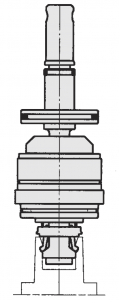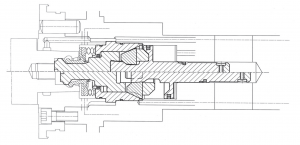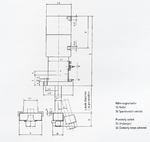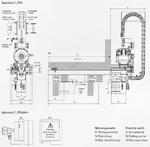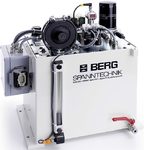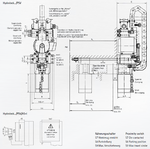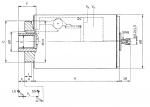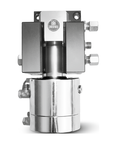291-SHR-CAPTO
BERG Capto Hydraulic Self-Locking Clamping Systems
The self-limiting clamping system for Coromant Capto tools developed by BERG Spanntechnik is used in conjunction with Coromant Capto clamping sets. In this solution the wedge drive is rigidly connected to the clamping set via a drawbar.
![]() PDF Data Sheet: BERG Capto Hydraulic Self-Locking Clamping Systems (291-SHR-CAPTO)
PDF Data Sheet: BERG Capto Hydraulic Self-Locking Clamping Systems (291-SHR-CAPTO)
ApplicationThe self-limiting clamping system for Coromant Capto tools developed by BERG Spanntechnik is used in conjunction with Coromant Capto clamping sets. In this solution the wedge drive is rigidly connected to the clamping set via a drawbar. The wedge drive can be directly hydraulically or mechanically actuated. The absolute self-limitation of the system guarantees high mechanical overall rigidity of the interface in conjunction with maximum clamping reliability. The direct hydraulic actuation, in particular, permits extremely small installation spaces with low operating pressures for the complete clamping and chucking system.
Design FeaturesA double-acting cylinder leads directly into a clamping cone which has a very low gradient. During clamping this clamping cone presses the pressure elements resting on it into the similarly tapered housing hole. This displaces the wedge piece in the axial direction. As the wedge pieces rest in windows of the main drawbar, they are also axially displaced (clamping stroke). The cone angle and surface properties are designed to guarantee absolutely reliable self-limitation. In addition to the hydraulic actuation the system can also be driven dry by direct connection to draw/push-bar. All systems are completely maintenance-free due to their respective surface properties!
AccessoriesAdapters, hydraulic units, clamping force measuring device, volume flow measuring device for stroke control.
For more information regarding this item (BERG Capto Hydraulic Self-Locking Clamping Systems) or other items, fill out the form below
or contact our office directly:
Telephone: 815-962-5600
Fax: 815-962-4600
Location: 304 North Main St, Suite 104, Rockford, IL 61101-1101 USA
Email: infο@ΤΑCRοckfοrd.cοm
Related
Capto Clamping Systems
BERG Spanntechnik is a leading supplier of Capto grippers and clamping systems.
Stationary Hydraulic Self-locking Swing-out Style Clamping Systems
Hydraulic, self-locking stationary swing-out style clamp for die clamping on slides and blackholders. When unclamping the draw bar swings out up to 15 degrees max.
Automatic Hydro-mechanical Self-locking C-clamping Systems
The C-clamping hydromechanical self-locking (hydrolock) die clamping system is designed for clamping dies of various widths on press slides. The clamping actuator moves automatically in the T-slot of the press slide between the parking position and the respective die. Clamping and unclamping are performed by a hydromechanical self-locking clamping gear. Hydraulic pressure is at a maximum of 90 bar.
Hydraulic Power Stations for Hydraulic Quick Die Clamping Systems
Hydraulic power stations for quick die clamping systems are designed for actuating hydraulic clamping elements in the forming presses. A large number of electro-hydraulic (HA) or air-hydraulic power stations (HAL) are available depending on the use of the clamping elements and/or hydraulics on the press plunger or on the table, as well as the number of clamping elements.
Automatic Hydro-mechanical Self-locking Drawbar Style Clamping Systems
The drawbar style hydromechanical (hydrolock) self-locking die clamping system is designed for clamping dies of various widths on press slides. The clamping actuator moves automatically in the T-slot of the press slide between the parking position and the respective die. Clamping and unclamping are performed by a hydromechanical self-locking clamping gear. Hydraulic pressure is at a maximum 90 bar.
SKVZ Tool Clamping Cylinders
SKVZ locking heads are designed for limiting the springing out resilience of the tools to the elastic yield of the connection elements when the axially acting cutting force components are larger than the clamping force on spring actuated tool clamping and chucking systems.
Manual Hydro-mechanical Self-locking C-clamping Systems
The hydromechanical self-locking (hydrolock) C-clamping die clamping system is designed for clamping dies of various widths on press slides. The clamping actuator can be moved manually in the T-slot of the press slide between the parking position and the respective die. Hydraulic pressure is at a maximum 90 bar.
HSK Hydraulic Self-Locking Clamping Systems
The self-limiting clamping system for HSK tools developed by BERG Spanntechnik is used in conjunction with the proven HSH clamping sets. In this solution the wedge drive itself is rigidly connected to the clamping set via a drawbar.
Manual Hydro-mechanical Self-locking Drawbar Style Clamping Systems
The hydromechanical self-locking (hydrolock) drawbar style die clamping system is designed for clamping dies of various widths on press slides. The clamping actuator can be moved manually in the T-slot of the press slide between the parking position and the respective die. Hydraulic pressure is at a maximum 90 bar.



